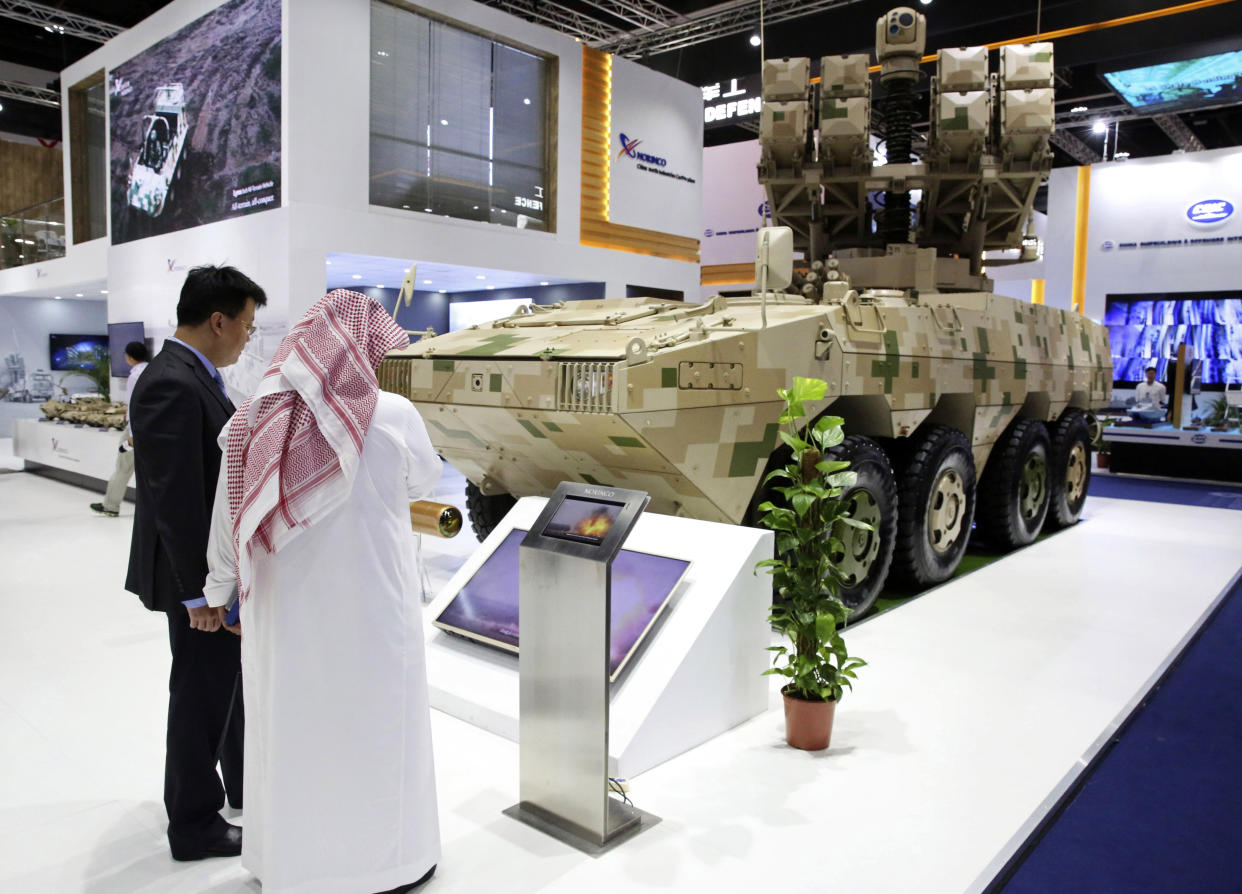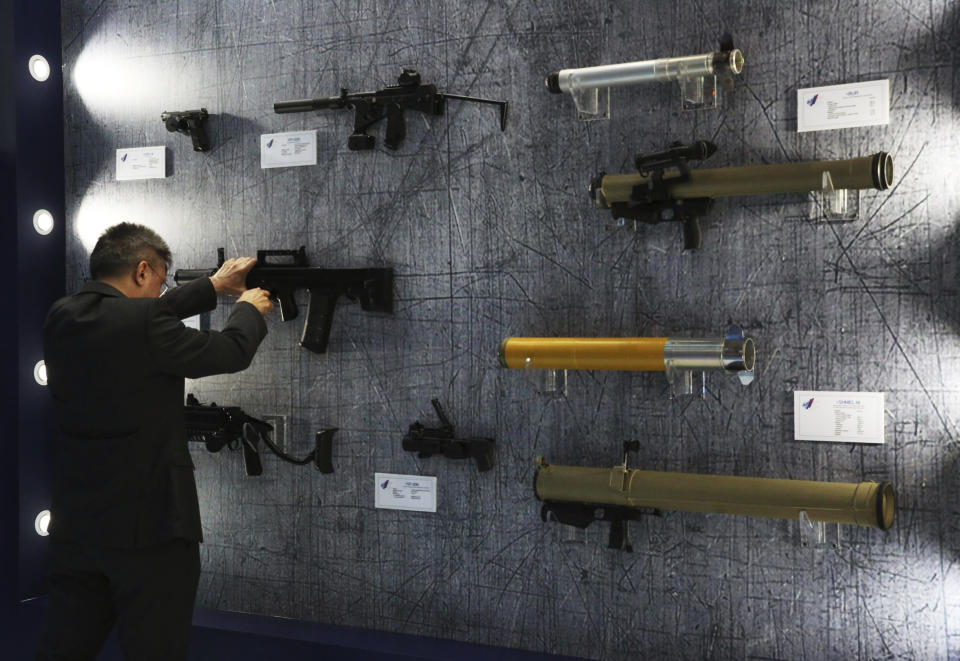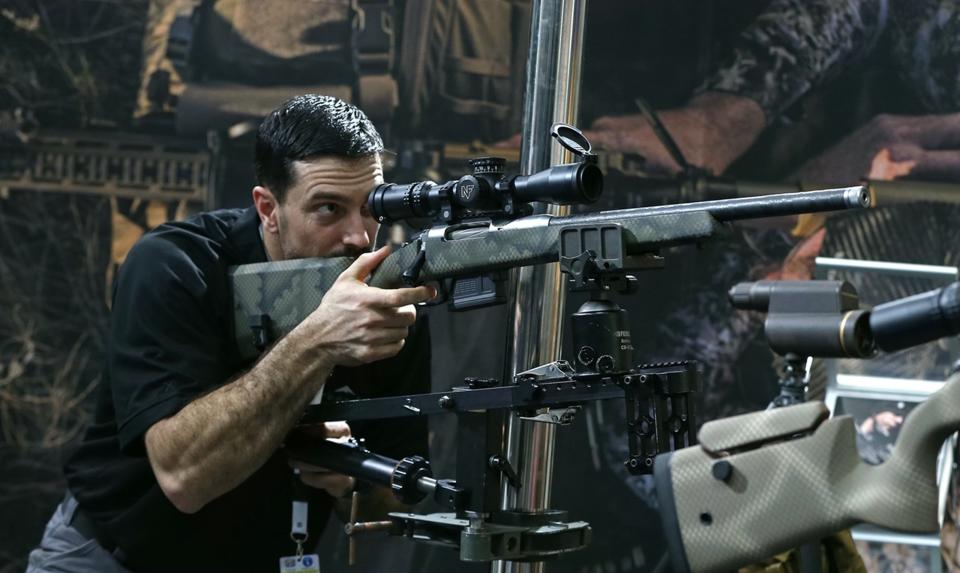As concerns grow about faltering U.S. support for UAE, China steps in to fill the void

ABU DHABI, United Arab Emirates — In the downtown area of United Arab Emirate’s second most populous city, massive banners advertising Huawei — the Chinese telecommunications giant that recently came under scrutiny by U.S. officials — adorn buildings and roadways.
China’s growing influence in this oil-rich Gulf state can also be seen this week at the 25th biannual International Defense Exhibition, known as IDEX, where defense companies from around the world come to sell their wares, ranging from helicopters and machine guns to drones and surveillance systems. While representatives from more than 100 U.S. companies were present this year, the China pavilion, located on the other end of the conference center from the U.S. booths, also had a sizeable presence, with some 50 Chinese companies, research institutions and government displays.
Concerns about China moving in on an arms market once safely dominated by the United States is on the minds of U.S. defense industry officials attending the show. They also worried about the appearance of declining U.S. government support for Gulf countries amid controversies over the killing of Washington Post columnist Jamal Khashoggi and increasing opposition to the war in Yemen.

“We face great headwinds in Washington, D.C., and other capitals around the world,” said Danny Sebright, president of the U.S.-U.A.E. Business Council, at a dinner the group hosted on Sunday. “We must come together to educate others. …Go back to Washington and make sure your members of Congress know how important this relationship is.”
While the United States remains a steadfast ally of UAE, and is the largest supplier of arms to the Middle East, relations with its Gulf allies have become strained over the past several years. The Saudi and UAE-led war in Yemen faces increasing opposition in Congress, and the ongoing blockade of Qatar, also a U.S. ally, has become a headache in Washington.
That has increased opportunities for countries like China and Russia to step in, according to retired Gen. Jack Keane, executive chairman of AM General, a company that produces military vehicles. “We’ve returned to an era of great power competition with China and Russia,” he said in a speech at IDEX.

Keane, who was rumored to be one of President Trump’s picks for secretary of defense before retired Marine Gen. Jim Mattis was nominated, noted that Russia has made strong inroads into the region with arms sales, in addition to other projects. And “China is here with major economic initiatives,” he said.
One defense executive told Yahoo News that a UAE military official had said his grandchildren were learning Mandarin. This vignette was emblematic of the growing Chinese presence in the Gulf, said the executive, who added this influence is not being dealt with in Washington.
Trump last year tapped a major political donor, John Rakolta, to be ambassador to the UAE, but Congress has yet to take up his nomination, and the absence of a top diplomat is keenly felt, according to the U.S. industry officials. ”They’re worried the administration is losing interest,” said one industry source.
When it comes to arms sales, the United States is still the leader in the region — American defense titan Raytheon announced the sale to UAE of more $1.5 billion dollars worth of rocket launchers on the second day of the conference — and the Trump administration has worked to smooth the regulatory process. In April 2018, the administration released a new version of the U.S. Conventional Arms Transfer Policy, which will allow for a more streamlined process for arms sales overseas.
One U.S. official told Yahoo News that conversations with Congress have revolved around the China talking point: If Washington doesn’t offer the weapons, Beijing will.

While it’s unclear precisely how much Chinese arms sales to the UAE have grown, since many of the sales are not announced publicly, there have been some high-profile deals in recent years, including the Chinese Wing Loong II, an armed drone similar to the U.S.-made MQ-9 Reaper.
China has also invested heavily in advanced technologies in recent years, while also benefiting from economic espionage and copying U.S. designs, according to U.S. officials. And arms exhibitions like IDEX offer an easy opportunity for Chinese and other foreign nationals to collect information on what the U.S. defense industry is offering.
“The Chinese spies are out in force,” said one high-ranking U.S. industry official. “They’re not subtle about it.”
Another industry official said that kind of behavior was par for the course on all sides, given the open environment. “It’s like Vienna in the 1950s,” the official said. “Everybody’s playing everybody.”

American suppliers, recognizing the competition, are working to highlight U.S. connections, according to retired Lt. Gen. Patricia McQuistion, a vice president at the Association of the United States Army. At this year’s exhibition, the organization ramped up the signage and displays for the American booths so buyers know exactly who they’re dealing with. “There’s going to be red, white and blue everywhere,” she said, pointing to a U.S. flag on the table.
But there’s concern in the business community about the new Congress, which may be less open to providing training, intelligence and weaponry to the UAE. “In Congress, there has been increased opposition to both arms sales to Saudi Arabia and U.S. support to the Saudi-led coalition in Yemen,” the U.S.-U.A.E. Business Council stated in its February 2019 report. “Although this opposition has centered on Saudi Arabia, it has spilled over to the UAE as well.”
The House of Representatives this month passed a war powers resolution that would withdraw U.S. support for the Gulf-led coalition in Yemen. A similar measure passed the Senate in the last Congress when Republicans held both chambers, and, if passed again, would be a major victory for lawmakers looking to make changes in U.S. foreign policy.

At IDEX, U.S. and UAE officials tried to direct the conversation back to what they see as a common threat that binds the United States and the UAE: Iran. Speaking at a dinner during the arms exhibition, UAE’s Minister of State for Defense Affairs, Mohammed bin Ahmad Al Bowardi, highlighted the “destabilizing [force] of Iran in the region.”
Speaking at the U.S.-U.A.E. Business Council dinner on Sunday, Jennifer Zakriski, the principle director of the Office of the Secretary of Defense’s Middle East Policy Division, made clear where the Pentagon believes the biggest threat comes from. “Threats from Iran and terrorism,” she said, are “key.”
Keane, the retired general, said that the congressional rebuke of the war in Yemen was a response to frustration with the ongoing conflict. “I would’ve taken a different approach,” he told Yahoo News. “I would like to see the U.S. lead a humanitarian effort with the international community. … What I don’t agree with is walking away.”
Proponents of the U.S.-UAE relationship say that if the United States does walk away, it creates opportunities for competitors, both in arms sales and political influence.
China and Russia “covet the relationships here in the Middle East,” Keane said. “Choices will have to be made by the countries here.”

_____
Read more from Yahoo News:
Ann Coulter: ‘Lunatic’ Trump could be challenged in 2020 — from the right
As Trump administration negotiates with Taliban, some retired U.S. generals see defeat
Crackdown on opioids has its own victims: People who need them to live
As 5G war with China heats up, could a Cold War-inspired plan be the solution?

